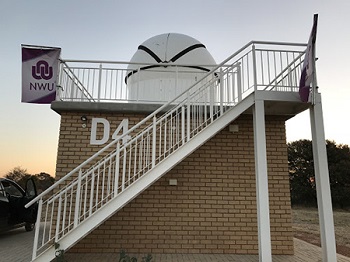The Faculty of Natural and Agricultural Sciences (FNAS) at the North-West University (NWU) hosted an online colloquium about its Mahikeng Astronomical Observatory (MAO) on 12 July 2021.
The title of the colloquium was “NWU Mahikeng Astronomical Observatory: science cases and usage”.
According to Prof James Chibueze, the main purpose of the colloquium was to share more information on the observatory, one of the two optical observatories owned and operated by the faculty.
“The colloquium provided answers to various questions, including what science can be done at MAO, how NWU staff members and students can gain access to and use the telescope, and what future upgrades are planned for the observatory,” says Prof Chibueze.
Prof Thebe Medupe, the faculty’s deputy dean for community engagement and stakeholder relations, says the purpose of the MAO is to develop astronomy and related sciences at historically disadvantaged universities and also to demonstrate the country’s growing capabilities in the field.
“The MAO telescopes can be operated remotely and are used for research, undergraduate and postgraduate teaching, community outreach projects and school visits.
“The telescopes are used for research on bright pulsating stars, for big international campaigns to study planets around other stars (exoplanets), as well as making ground-based follow-up observations of stars in support of space telescopes such as the Transiting Exoplanet Survey Satellite (TESS),” he adds.
Prof Chibueze adds that the telescope can also be used to study solar systems, dying stars popularly called planetary nebulae, star clusters and galaxies.
Prof Medupe says the new telescope – which is currently located west of the Soccer Institute building on the NWU’s Mahikeng Campus – will later be installed on the university’s farm to avoid light pollution. The old telescope will remain at the current site, making it more accessible to students and members of the public.
“The best period for observations is during winter (April to early September). The main challenge in summer is the humidity and clouds, but there are efforts underway to improve the observing conditions at MAO.
“Once Covid-19 restrictions are relaxed, prepare yourselves for regular open nights of viewing the cosmos,” concludes Prof Medupe.

The NWU Mahikeng Astronomical Observatory.
